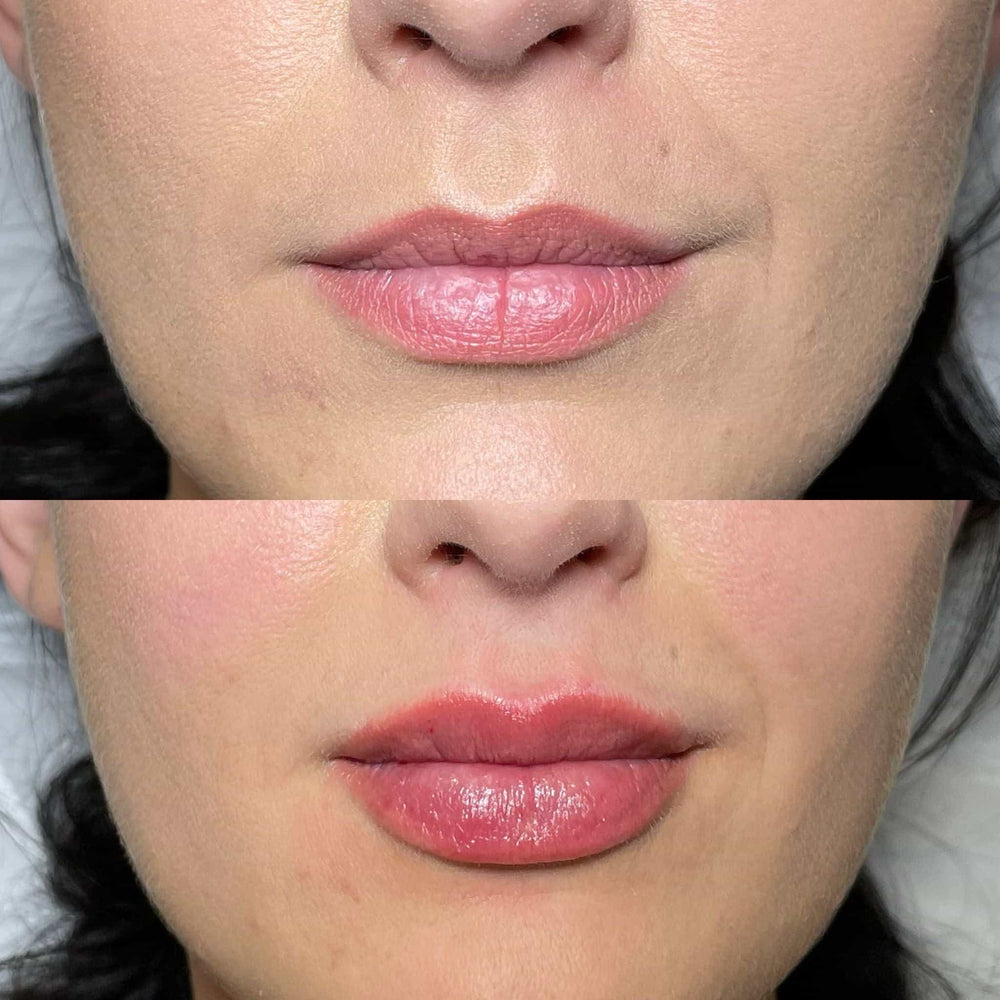Arrange a Dermal Filler Consultation at It’s Me and You Clinic with Dr. Laura Geige
Immediate Effects
Swelling & Bruising
Reserve Your Dermal Filler Consultation with Dr. Laura Geige
Smoking after lip filler can significantly impact the healing process and increase the risk of complications.
One of the most immediate effects of smoking after lip filler is an increased risk of swelling and bruising.

Nicotine in cigarettes constricts blood vessels, which reduces blood flow to the injected area. This impaired circulation hinders the body’s natural healing processes and can lead to prolonged swelling and discoloration.
Furthermore, smoking damages collagen and elastin fibers, essential for skin elasticity and wound healing.
This damage can worsen bruising and contribute to a less smooth and even appearance of the treated lips.
Smoking also weakens the immune system, making it more difficult for the body to fight off infections.
Any minor punctures from the needle injections become more susceptible to infection in individuals who smoke.
Inflammation
Immediately after receiving lip fillers, it’s crucial to avoid smoking as it can significantly impede the healing process and potentially lead to complications.
Smoking constricts blood vessels, which impairs blood flow and oxygen delivery to the injection sites. This can hinder the body’s natural healing mechanisms and delay the absorption of fillers.
Additionally, smoking increases inflammation throughout the body. Lip fillers introduce a foreign substance into the tissues, which naturally triggers an inflammatory response.
The inflammatory process is essential for wound healing but can be exacerbated by smoking. Increased inflammation can lead to swelling, redness, bruising, and discomfort that may last longer and be more intense than usual.
Furthermore, smoking introduces harmful toxins into the bloodstream, which can damage healthy tissue and interfere with the body’s ability to regenerate.
This increased risk of tissue damage can make it harder for fillers to integrate properly and may even increase the likelihood of filler migration or lumps forming.
Impact on Filler Distribution
Smoking immediately after getting lip filler can have several detrimental effects on both the procedure’s outcome and overall health.
Here are some immediate effects to be aware of:
- Increased Risk of Swelling and Bruising: Nicotine constricts blood vessels, which can impede circulation and contribute to increased swelling and bruising at the injection site.
- Delayed Healing:** Smoking hinders the body’s natural healing processes. This can prolong the time it takes for your lips to recover from the filler injections.
- Reduced Filler Efficacy: Nicotine interferes with collagen production, a vital protein that provides structure and volume to the lips. This can diminish the effectiveness of the filler and lead to less noticeable results.
- Higher Risk of Complications:** Smoking can increase the risk of infection and other complications associated with any invasive procedure.
Beyond these immediate concerns, smoking can have long-term impacts on how your lip filler distributes:
- Accelerated Breakdown of Filler: Smoking damages collagen and elastin fibers, both crucial for maintaining the longevity of dermal fillers.
- Uneven Distribution:** Smoking’s impact on blood circulation can contribute to uneven absorption and distribution of filler material.
- Premature Loss of Volume:**** Due to accelerated collagen breakdown, lip filler may wear off more quickly in smokers.
For optimal results and safety, it is strongly recommended to avoid smoking for at least 24 hours before and after getting lip filler. It’s also wise to discuss your smoking habits with your practitioner, as they can provide tailored advice based on your individual circumstances.
Long-Term Risks
Delayed Healing
Smoking significantly increases the risks associated with lip filler injections, both in the short and long term.
One major concern is **delayed healing**. Nicotine constricts blood vessels, which reduces blood flow to the injection site. This impaired circulation can slow down the body’s natural healing process.
Reduced blood flow also impacts nutrient delivery to the treated area, hindering the formation of new tissue and collagen. As a result, swelling may linger longer, bruising could be more prominent, and the overall recovery time can be extended significantly.
Furthermore, smoking weakens the immune system. This makes it harder for your body to fight off any potential infections or complications that may arise after the injection.
Beyond delayed healing, long-term risks associated with smoking after lip filler include:
* **Increased risk of infection:** The compromised immune system is more susceptible to bacterial and viral infections.
* **Asymmetrical results:** Nicotine’s impact on blood flow can lead to uneven absorption of the filler, resulting in one lip looking fuller than the other.
* Reduced longevity of the filler**: The toxins in cigarette smoke can break down hyaluronic acid, the main component of many fillers, leading to a faster reduction in volume.
* **Development of lumps or bumps:** Smoking can disrupt the filler’s smooth integration into the tissues, potentially causing irregular lumps or bumps to form.
Reduced Filler Longevity
Smoking can significantly impact the longevity of lip fillers.
Nicotine, a primary component of cigarette smoke, constricts blood vessels.
This reduced blood flow to the injection site hinders the body’s natural healing process and slows down the dispersal of filler material.
As a result, lip fillers may not integrate as smoothly into the surrounding tissues, leading to visible lumps or unevenness.
Furthermore, smoking accelerates collagen breakdown. Collagen is a crucial protein that provides structure and support to the skin.
The degradation of collagen can make the treated area more susceptible to wrinkles and sagging, ultimately diminishing the effectiveness of the lip filler.
Additionally, smoking exposes the lips to harmful chemicals and toxins that can irritate and damage delicate skin tissues. This irritation can contribute to inflammation, redness, and even infection at the injection site, further compromising the results and potentially increasing the risk of complications.
In essence, smoking acts as a double-edged sword, hindering both the absorption and longevity of lip fillers while accelerating the natural aging process.
Infection Risk
Smoking after lip filler injections can pose several long-term and immediate risks to your health and the aesthetic outcome.
**Long-Term Risks:**
- Premature Aging: Smoking significantly accelerates skin aging by damaging collagen and elastin, the proteins responsible for skin’s firmness and elasticity. This can lead to premature wrinkles, sagging skin, and a less youthful appearance, which can exacerbate any benefits from lip filler.
- **Increased Risk of Complications:** Smoking impairs wound healing and blood circulation, making you more susceptible to complications such as infection, bruising, swelling, and uneven distribution of the filler.
- Reduced Filler Longevity: Nicotine in cigarettes constricts blood vessels, hindering the delivery of nutrients and oxygen to the injected area. This can reduce the lifespan of your lip fillers, requiring more frequent touch-ups.
**Infection Risk:**
Smoking significantly increases your risk of infection after any procedure involving needles, including lip filler injections. The toxins in cigarette smoke suppress the immune system, making it harder for your body to fight off bacteria and other pathogens.
This heightened risk can lead to:
- Inflammation
- Abscesses
- Sepsis (a life-threatening blood infection)
It is crucial to consult with your injector and discuss any pre-existing medical conditions or habits, including smoking. They can advise you on the best course of action and potential risks.
Recommendations
The American Academy of Facial Plastic and Reconstructive Surgery’s Advice
Smoking significantly increases the risk of complications following lip filler injections.
Nicotine, a primary component in cigarette smoke, constricts blood vessels. This constriction reduces blood flow to the injection area, hindering the healing process and increasing the chances of uneven distribution of the filler.
Furthermore, smoking can weaken collagen production, a vital protein for skin elasticity and structure. Collagen is essential for maintaining youthful volume and preventing wrinkles. Weakened collagen further compromises the longevity of lip filler results.
The American Academy of Facial Plastic and Reconstructive Surgery (AAFPRS) strongly advises against smoking before or after lip filler treatments. They emphasize that smoking not only jeopardizes the effectiveness and safety of the procedure but can also lead to serious complications such as infection, bruising, and poor aesthetic outcomes.
Quitting smoking before your appointment is highly recommended for optimal results and a safer procedure.
Even if you have smoked in the past, abstaining from cigarettes leading up to and following treatment significantly improves the likelihood of a successful outcome and minimizes potential risks.
General Safety Tips for After Lip Filler
It’s essential to avoid smoking after getting lip fillers as it can significantly hinder healing and increase the risk of complications.
Smoking constricts blood vessels, which impairs the flow of blood to the treated area. This reduced blood circulation can delay the absorption of filler and slow down the natural healing process.
Nicotine, a key component in cigarette smoke, also negatively affects collagen production. Collagen is a vital protein that provides structure and elasticity to your skin. Smoking depletes collagen levels, which can lead to premature aging and make your lips more susceptible to wrinkles and unevenness.
Furthermore, smoking increases inflammation, another factor that can interfere with lip filler results. Inflammation can cause swelling, bruising, and redness, prolonging the recovery time and potentially leading to a bumpy or uneven appearance.
The risk of infection also increases when you smoke after lip filler. Smoking weakens your immune system, making it harder for your body to fight off infections.
Here are some general safety tips for after getting lip filler:
Avoid strenuous activity and heavy lifting for at least 24 hours to minimize swelling.
Apply a cold compress to the treated area for 15-20 minutes at a time to reduce inflammation.
Avoid touching or rubbing your lips excessively. This can irritate the area and increase the risk of infection.
Do not sleep on your stomach for the first few nights after treatment to prevent pressure on the filled lips.
Drink plenty of water to stay hydrated and aid in healing.
Use a gentle, fragrance-free moisturizer on the treated area as directed by your provider.
Follow your provider’s specific instructions regarding any medications or supplements you should avoid during the recovery period.
Get Your Dermal Filler Consultation with Dr. Laura Geige Today
If you experience any unusual symptoms, such as excessive swelling, severe pain, redness, or discharge, contact your provider immediately.
Dejour Magazine Emri Studio Alabama Sig Delt Back to Work Experts I Like Corbyn But
- Under Eye Botox In Woodmansterne, Surrey - November 17, 2025
- Why Breadcrumbing Is An Emotionally Unhealthy Dating Habit - November 3, 2025
- What Is The Alternative To Tear Trough Fillers? - October 31, 2025
